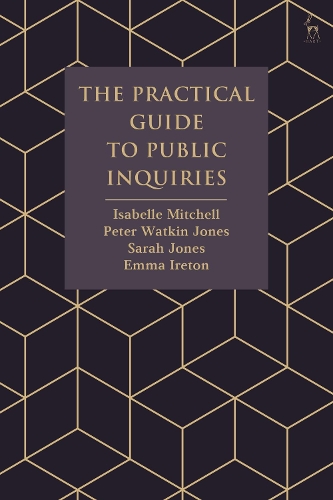
The Practical Guide to Public Inquiries
(Hardback)
Available Formats
Publishing Details
The Practical Guide to Public Inquiries
By (Author) Isabelle Mitchell
By (author) Peter Watkin Jones
By (author) Sarah Jones
By (author) Emma Ireton
Bloomsbury Publishing PLC
Hart Publishing
8th April 2021
United Kingdom
Classifications
Professional and Scholarly
Non Fiction
342.42066
Physical Properties
Hardback
328
Width 158mm, Height 236mm, Spine 26mm
640g
Description
This practical guide provides legal practitioners, participants, witnesses and all those with an interest in public inquiries, with stage-by-stage hands on guidance on the process of public inquiries into matters of public concern. With its user-friendly format of summaries, checklists, top tips and flow charts, this book looks at the setting up of a public inquiry through to its close. It includes information on: - the appointment of the chair and inquiry team; - the choice and significance of the venue; - the drawing up of inquiry procedures, protocols and rulings; - the appointment and role of core participants; - evidence taking; - conducting and attending hearings; - the role of experts; - the writing and publication of the inquiry report. Drawing on the authors extensive experience as public inquiry lawyers, working on inquiries such as the Bloody Sunday Inquiry, Mid Staffordshire NHS Foundation Trust Inquiry, Leveson Inquiry and Grenfell Tower Inquiry, together with contributions from a number of other eminent practitioners in the field, this book provides valuable, comprehensive guidance on the public inquiry process.
Reviews
The book offers a lucid and accessible foundation in the practicalities of establishing, running and concluding a public inquiry. Its coverage is comprehensive, and it will be a boon to those lawyers and civil servants working for an inquiry For those wanting an insight into public inquiries, this will be the go-to book. -- Ryan Ross, Farrars Building * Law Society Gazette *
The authors are to be complimented on an impressively comprehensive and authoritative guide to public inquiries. It addresses every aspect of their establishment and conduct, and provides clear guidance supplemented by eminently practical checklists, a boon to the busy practitioner. Such a guide is much needed, and will prove invaluable to all those involved in the wide range of statutory, non-statutory and other forms of inquiry that have become such a feature of our public life. * Sir Robert Owen, Chair, Litvinenko Inquiry *
This concise guide to inquiries fills a serious gap. It sets out to offer practical guidance on public inquiry procedure for inquiry teams, legal practitioners, participants, witnesses and all those interested in the public inquiry process and does this very well. The authors are well qualified; three work in the Inquiries and Investigations Team at Eversheds and Emma Ireton is a law lecturer who has researched inquiries for many years. The account is comprehensive; it follows the course of an inquiry from the pre-inquiry stage to the post-inquiry stage of lessons learned. The layout is easy to follow and, with its many examples of best (and worst) practice, those readers who are merely interested in the public inquiry process will find it a good read. * Carol Harlow, Emeritus Professor of Law, London School of Economics and Political Science *
The Practical Guide to Public Inquiries not only does exactly what it says on the tin but it does so with style and a level of detail that mines every conceivable aspect of the Public Inquiry process from its inception to ultimate conclusion. It will rapidly become essential reading for all those so engaged whether they be government officials tasked with setting up an inquiry, panel members, lawyers or members of the press or individuals, interested groups and families affected by the outcome. I found the use of boxed quotations and check lists to be of particular value in making this both a comprehensive and user-friendly tool for all concerned. * Barra McGrory QC, Former Director of Public Prosecutions in Northern Ireland *
My view is that this is an invaluable practitioners' guide for anyone coming to inquiry or investigative work whether in the public or private fields. The contributors list the major inquiries of the last twenty years; their expertise comes from having been in just about all of them. They cover every aspect of setting up an Inquiry from appointment of a Chair and their duties to data security and storage. I have already used it and will keep it with me. * Tom Crowther QC, Serjeants' Inn Chambers *
Author Bio
Isabelle Mitchell is Principal Associate at Eversheds Sutherland (International) LLP. Peter Watkin Jones is Consultant and former Eversheds partner and Head of the Eversheds Inquiries and Investigations Team. Sarah Jones is a Partner and Head of the Inquiries and Investigations team at Eversheds Sutherland (International) LLP. Emma Ireton is Senior Lecturer in Law at Nottingham Trent University.
